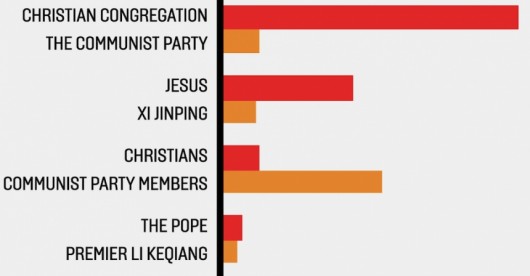
It’s odd to imagine Jesus, in China, is more discussed than historic leaders, but Weibo chatter suggests precisely that.
An infographic published by Foreign Policy (non-paywalled version here) last month showed that discussion of Christian terms is several times more common than similar political phrases.
While the disparity may be exaggerated by attempts to create a healthy environment for discussion, it reflects a growing trend as young adults born in the 1980s and 1990s rediscover religion.
Wang Lin, a sophomore at Beijing Language and Culture University, spends most of her free afternoons on the streets near Sanlitun. But while many of her peers are there to window shop for luxury brands, Wang is preaching the Christian gospel.
Although raised as an atheist, Wang says she started to believe in Christianity after inspiring passages from the Bible offered her guidance in confronting life’s challenges.
Wang is one of millions of young converts.
Although the government’s “2010 Blue Book on Religion” says China has 23 million Christian adherents, Li Fan, director of the World and China Institute, estimates the country may have 100 million believers: 7 percent of the population. Roughly 27 percent of them follow Catholicism.
By contrast, the country has an estimated 20 million Muslims, including the Uyghur, Kazakh and Dongxiang ethnicities, which are traditionally Islamic.
Christianity has spread rapidly during the past decade thanks to the proselytizing of young devotees on college campuses in Beijing, Shanghai, Nanjing and Wuhan. Most streets, shopping malls and restaurants have preachers out to offer improvised sermons to anyone willing to listen.
But China’s young Christians tend to pick and choose what parts to believe. Zhang, a pastor at Beijing Chaoyang Church, says that many young Chinese discover the religion while trying to escape from high-pressure jobs or disappointing marriages.
Recent Chinese generations have a profoundly narcissistic streak, she says. For many young adults, normal human troubles can be a great source of frustration. Christian teachings offer valuable lessons in tolerance, humility and compassion, she said.
Seven of the church’s eight full-time aides are in their 20s or 30s, said Zhang.
A long history
Zhang’s church is part of China’s Three-Self Patriotic Movement, the nation’s only registered Protestant church. The movement, formed after the communist revolution, is largely shaped by the teachings of Wu Yao-tsung, a Congregationalist proponent of the social gospel.
Christianity has a long history with China, arriving with Nestorian missionaries in the early years of the Tang Dynasty (618-907).
Although the Nestorian mission faded with the Church of the East, Jesuits returned in the late Ming Dynasty: over the next 200 years, they penned the first Chinese dictionaries in a European language and won positions in Beijing as science tutors to the Kangxi Emperor and court advisers.
However, a dispute with the Dominicans led the Qing court to ban Christianity, and through the 19th and 20th centuries most of China’s contact with the religion came by way of Protestant missionaries operating in Treaty Ports – a group that inspired Hong Xiuquan, the revolutionary better known as “God’s Chinese son.”
The religion survived in the Republican era, winning such high-ranking converts as Sun Yat-sen.
“The Jerusalem of China”
But in spite of its large and active community, Beijing is not China’s center of Christian worship.
While most associate Wenzhou with its fabulously wealthy entrepreneurs, China’s Christians know it as the “Jerusalem of China.” The southern city has more than 1,100 churches, most of which were built or rebuilt after the Cultural Revolution, says Ouyang Houzeng, vice president of the China Christian Council.
Wu Ruomiao, a teacher at Xiushan Junior High School in Wenzhou, says most of the city’s Christians are born into practicing families rather than recent converts.
Although the city has many young adults active in proselytizing, Wu says they do not have a persuasive influence. While her friends convinced her to read the Bible, Wu found little she could agree on aside from their Calvinist interpretation of Original Sin.
Wu says she believes life is less organized than religion makes it seem, and that death is certain. She also believes people do not require divine assistance to learn to do good.
Drifting between faiths
But in spite of Christianity’s growth, traditional Buddhism remains a strong competitor.
Xia Mingyuan, a graduate of the University of International Business and Economics, says he left Christianity for Buddhism when he found the religion’s values in conflict with his own. He was especially disturbed by the problem of evil.
Many believers in Wenzhou blindly follow Christianity because of their family, he says. Others merely copy the religion of their favorite business and entertainment idols like Bian Shuping and Yao Chen in hopes of emulating their wealth and success.
Those seeking inner peace seem to find their way to Buddhism, says Cai Bimei, editor of Nanfang Weekly.
Cai says she recites her favorite Sutras sometimes when she feels afraid, though she has not spent much time analyzing their meaning. “True believers” are people she associates whose lives are especially hard, she says.
Li Ang, a student at Beijing University of Chemical Technology, says Buddhism is more popular with his classmates than Christianity, though most have only a superficial understanding that involves ghosts and supernatural beings.
Few have explored its deeper teachings.
Disillusioned with political ideologies and promises, Li says most of his peers are searching for something to believe. But without a spiritual foundation or grounding in tradition, many end up merely going through the motions and bribing the divine to rain down favor.
Doing good for the sake of good, leaning from their mistakes and bettering society are rarely their goal, he says. But hearts and minds are evolving slowly.
This post originally appeared in Beijing Today.
















































